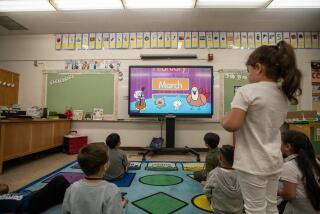Program Benefits Kids With Most to Lose, Survey Finds
- Share via
WASHINGTON — Toddlers enrolled in a federal program that coaches parents in learning techniques are less likely to need discipline and more likely to read than children not participating in Early Head Start, a government study found.
The program, geared for low-income parents and their children from birth to age 3, helped families get along better and improved toddlers’ scores on standardized tests, according to the study issued today. Early Head Start was found to have had the greatest effect on the poorest families.
“It’s a very impressive finding when you say, ‘The ones we had the biggest impact with were those that face the most challenges,’” said author Wade Horn, the assistant secretary for children and families at the Health and Human Services Department.
Parents in Early Head Start are taught how to keep their children safe and to discipline them gently, Horn said. Adults are reminded to get youngsters inoculated and are encouraged to read frequently to their infants from age 6 months on.
Parents also get coached about helping their children learn, for example, by walking down the street with them and counting the number of trees along the street, Horn said.
The positive effects of Early Head Start increased over time, Horn said, in contrast with most other child-intervention programs.
Head Start was expanded to include Early Head Start in 1995, when many poor parents were employed or at school because of welfare reform and a strong economy.
Some Early Head Start programs are combined with day care at community centers, some involve visits to the family’s home and some combine both.
About 55,000 children are enrolled in the program in 664 communities.
The study showed that the program helped lift parents’ depression and increased school attendance among teenage parents.
The study of 3,001 families in 17 programs also found that:
Early Head Start children ages 2 and 3 sustained higher average scores on standardized tests measuring cognitive and language development than a control group of children not in the program.
Early Head Start parents were slightly more likely to read to their children than those not in the program. They also were gentler, with 46.7% saying they had spanked their children in the last week, compared with 53.8% of the control group parents.
The study makes some recommendations, including that center-based programs offer more parenting services and that home-based programs offer more visits and more services.
More to Read
Sign up for Essential California
The most important California stories and recommendations in your inbox every morning.
You may occasionally receive promotional content from the Los Angeles Times.










